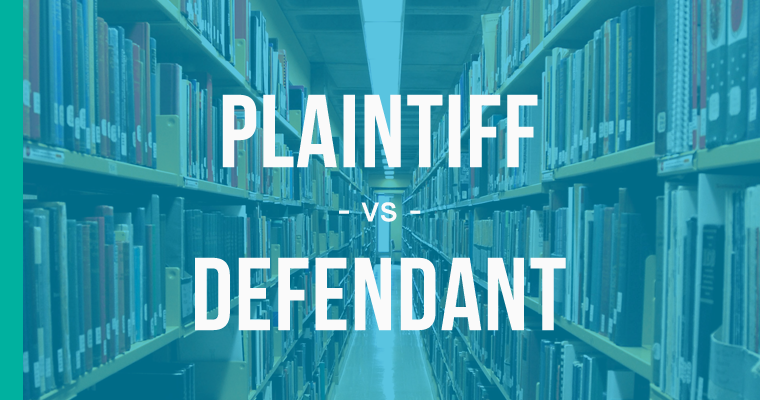Plaintiff vs. Defendant – How to Use Each Correctly

What is the Difference Between Plaintiff and Defendant?
Contents
Plaintiff and defendant are both legal terms regarding the people involved in a trial, usually a civil trial. However, they have opposite meanings and cannot be interchanged.
Plaintiff is a noun that means the person who brings a suit. In other words, this is the person who is accusing another of some wrongdoing in a court of law, or in a lawsuit.
- The plaintiff hoped that the judge would rule in his favor, so that he could win the money he believed that the defendant had wrongfully taken from him.
Defendant is a noun that means the person, or group, against which a suit or claim is filed. In other words, the defendant is the person who the plaintiff accuses.
- Many people believed the defendant was guilty of murder before the trial even started.
Now, let’s go over the specific ways each of these words are used.
Using Plaintiff in a Sentence
When to use plaintiff: Plaintiff is a noun that refers to a person in a court trial who is accusing another person of a crime or wrongdoing.
For example,
- The plaintiff states that the defendant injured him while performing surgery, and that he should be compensated in the amount of 100,000 dollars.
- In this court case, the plaintiff claims that the defendant, who was the plaintiff’s previous landlord, never paid back the deposit on her apartment. However, the plaintiff says that she rightfully deserves it.
Cases involving plaintiffs and defendants usually occur in civil law cases, especially personal injury cases, property damage cases, or cases that involve contracts being broken. It is possible to have more than one plaintiff or defendant in the same case. Usually the plaintiff hopes to receive compensation in the form of money or injunctions.
Using Defendant in a Sentence
When to use defendant: Defendant has the opposite meaning of plaintiff. While the plaintiff is the person who files a claim with a complaint, the defendant is the person the plaintiff accuses of doing something wrong.
For example:
- The defendant stated that he had to keep the apartment’s deposit because of the significant cleaning fees he was forced to pay due to the disgusting condition the plaintiff left the apartment in.
- The judge found in the defendant’s favor, when the defendant was able to prove that the plaintiff was lying about the claims he had filed against the defendant.
Plaintiff and defendant are most often used equally frequently, since one cannot have a defendant without a plaintiff, and vice versa.
Remembering Plaintiff vs. Defendant
One way to remember the difference between these two words is to use the spelling of each as a mnemonic device.
Plaintiff starts with the same letters as end the word complaint: plaint. This is no coincidence, since the words are related. The plaintiff is the person who has a complaint.
Alternatively, defendant starts with the word defend. This is also not an accident, since the defendant is the person defending himself or herself against the complaint.
Outside Examples
- His reasons include legal technicalities, such as the statute of limitations, lack of standing by plaintiffs, the improper joining of plaintiffs in one suit, insufficient facts, and failure to meet legal standards. –USA Today
- Two judges with the Second Circuit Court of Appeals ruled Wednesday that the case shouldn’t go forward in civil court because the plaintiff, a former cadet who says she was raped, is seeking damages. Awarding damages to a member of the military in such a case wouldn’t be handled in civil court, they said. –New York Post
- “The defendant in question is charged with a crime of violence, which makes us even more reluctant to make hasty decisions,” the sheriff’s office stated. “The defendant, through his attorney, has agreed to allow us additional time to investigate the matter further by continuing the (court hearing on the question) until next week.” –Chicago Tribune
- The indictment charged Vrdolyak with impeding the IRS and tax evasion. He faces a maximum of eight years in prison for allegedly trying to help his co-defendant, Daniel Soso, dodge federal income taxes. –Chicago Sun Times
Quiz: Defendant vs. Plaintiff
Instructions: Fill in the blank with the correct word, either defendant or plaintiff, in the correct form.
- The _______________ must file her claim before next year, before the statute of limitations runs out.
- The ____________________ claims that he did not damage the _____________________ property, and therefore owes him nothing.
- This case has multiple _______________ who all claim the same surgeon operated on them negligently.
See answers below.
Article Summary
Should I use plaintiff or defendant? Although these words usually appear together, and they both are legal terms, they have opposite meanings.
- A plaintiff is a person in a civil lawsuit who claims another person did something wrong.
- A defendant is a person in a civil lawsuit who is accused of doing something wrong.
Make sure you do not mix up these two words.
Quiz Answers
- plaintiff
- defendant, plaintiff’s
- plaintiffs
